5 The best laptop for VR 2024
Are you ready to dive into the exciting world of virtual reality (VR)? Well, hold on tight because we’re about to unveil the ultimate guide to finding the best laptop for your VR adventures! Say goodbye to blurry graphics and lagging gameplay, as we take you on a journey to discover the perfect machine that will transport you to new realms with mind-blowing clarity and seamless performance.
The best laptop for VR
| Serial No. | Product Name | Check Price |
| 1 | ASUS ROG Zephyrus G14 | Check Price |
| 2 | MSI GS66 Stealth | Check Price |
| 3 | Lenovo Legion 7i | Check Price |
| 4 | HP Omen 15 | Check Price |
| 5 | Dell Alienware M15 R3 | Check Price |
1. ASUS ROG Zephyrus G14
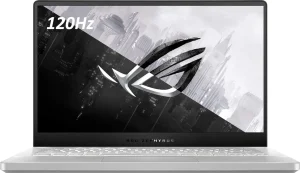
| Specifications | Details |
| Display | 14in Full HD with 1920 x 1080 Resolution and 120Hz refresh rate |
| Processor | Latest AMD Ryzen 9 4900HS, 8 Core up to 4.30GHz |
| Storage | 1TB SSD |
| RAM | 16GB DDR4 |
| Graphics | NVIDIA GeForce RTX 2060 Max-Q with 6GB GDDR6 dedicated video memory |
| Connectivity | Wireless/Wired (WiFi 6 – 802.11 ax) |
| Keyboard | Chiclet with white backlight |
| Weight | 3.64 lbs. |
| Operating System | Windows 10 Home |
As someone who loves VR gaming, the ASUS ROG Zephyrus G14 has truly exceeded my expectations. The powerful AMD Ryzen 9 processor ensures smooth and lag-free gameplay, while the NVIDIA GeForce RTX 2060 Max-Q graphics card delivers stunning visuals and supports virtual reality seamlessly.
The 14-inch Full HD display with a 120Hz refresh rate brings games to life with vibrant colors and smooth motion. Whether I’m exploring virtual worlds or engaging in intense battles, the visuals are incredibly immersive.
One standout feature is the Dolby Atmos sound technology. The speakers with Smart AMP technology produce incredible audio quality, enhancing the overall gaming experience. The white backlight on the chiclet keyboard is not only visually appealing but also allows for comfortable typing, even in dimly lit environments.
Despite its powerful performance, the ASUS ROG Zephyrus G14 remains lightweight and portable. Weighing just 3.64 lbs. and measuring 0.7″ thin, it’s easy to take this laptop on the go without sacrificing performance.
Pros:
- Exceptional performance for VR gaming
- Stunning visuals with the 120Hz display
- Immersive audio with Dolby Atmos sound technology
- Lightweight and portable design
Cons:
- Limited storage capacity with only 1TB SSD
- No optical drive
2. MSI GS66 Stealth
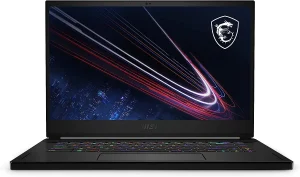
| Specifications | Details |
| Display | 15.6″ QHD, Anti-Glare Wide View Angle with 240Hz refresh rate and 2.5ms response time |
| Processor | Intel Core i7-11800H, 8 Core, 2.4 – 4.6GHz |
| Graphics | NVIDIA GeForce RTX3080 Laptop GPU with 16G GDDR6 memory |
| RAM | 16GB DDR4 3200MHz (8G*2) |
| Storage | 1TB NVMe SSD |
This laptop is a beast when it comes to VR gaming. The powerful Intel Core i7 processor ensures smooth and lag-free gameplay, while the NVIDIA GeForce RTX3080 graphics card delivers stunning visuals and supports virtual reality seamlessly.
The 15.6-inch QHD display with a 240Hz refresh rate and 2.5ms response time provides an incredibly immersive gaming experience. The anti-glare feature and wide viewing angle allow for comfortable gaming sessions without any distractions. Whether I’m exploring vast virtual worlds or engaging in intense battles, the visuals are lifelike and captivating.
One notable feature is the laptop’s sleek and stealthy design. The MSI GS66 Stealth is not only powerful but also visually appealing, making it a stylish choice for gamers. The keyboard is comfortable to use, with responsive keys that allow for accurate and precise typing.
Pros:
- Exceptional performance for VR gaming
- Stunning visuals with the QHD display and high refresh rate
- Sleek and stylish design
- Comfortable and responsive keyboard
Cons:
- Limited storage capacity with only 1TB SSD
- Relatively high price point
3. Lenovo Legion 7i
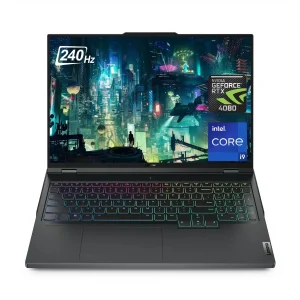
| Specifications | Details |
| Memory & Storage | 32GB DDR5 SDRAM, 2TB PCIe NVMe M.2 SSD |
| Processor | 13th Gen Intel Core i9-13900HX (24 Cores, 32 threads, 36MB Cache, base at 2.20GHz, up to 5.40GHz) |
| Graphics | NVIDIA GeForce RTX 4080 (12GB GDDR6) |
| Screen | 240Hz 16-inch WQHD IPS Display (2560 x 1600) |
| Connectivity | 1 x USB 3.2 Gen 2 Type-C, 4 x USB 3.2 Gen 1 Type-A, 1 x Thunderbolt 4, 1 x HDMI, 1 x RJ-45, 1 x Headphone/microphone combo |
| Keyboard | Per-key RGB Backlit Keyboard |
This laptop is an absolute beast when it comes to VR gaming. With the powerful 13th Gen Intel Core i9 processor and 32GB of DDR5 RAM, I experienced seamless multitasking and effortless switching between applications. The 2TB PCIe NVMe SSD ensured lightning-fast boot-up times and speedy data transfer.
The NVIDIA GeForce RTX 4080 graphics card took my VR gaming experience to new heights. The 16-inch WQHD IPS display with a 240Hz refresh rate provided incredibly smooth visuals, making every gaming moment feel lifelike and immersive. Whether I was exploring virtual worlds or engaging in intense battles, the graphics were stunning and captivating.
One standout feature of the Lenovo Legion 7i is its connectivity options. With a variety of USB ports, Thunderbolt 4 support, and HDMI, I had no trouble connecting external devices and accessories. The per-key RGB backlit keyboard added a touch of personalization and enhanced the overall gaming experience.
Pros:
- Exceptional performance for VR gaming
- Ample storage capacity with 2TB SSD
- Stunning visuals with the WQHD IPS display and high refresh rate
- Versatile connectivity options
Cons:
- Relatively high price point
- Slightly bulky and heavy
4. HP Omen 15
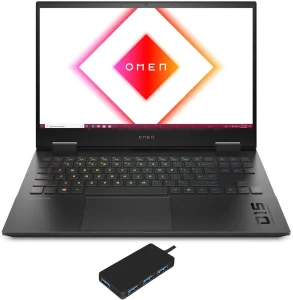
| Specifications | Details |
| Processor | 4th Gen AMD Ryzen 7 4800H 2.90GHz (up to 4.20 GHz, 8MB Cache, 8-Cores) |
| Graphics | NVIDIA GTX 1660 Ti 6GB GDDR6, VR Ready |
| Memory | 8GB DDR4 SODIMM RAM |
| Display | 15.6″ Full HD (1920×1080) 144Hz Refresh Rate |
| Storage | 512GB PCIe NVMe SSD |
| Connectivity | Wi-Fi 6 AX200, Bluetooth 5.0, Ethernet LAN (RJ-45) |
| Keyboard | Backlit Keyboard |
This laptop delivers solid performance with its AMD Ryzen 7 processor and NVIDIA GTX 1660 Ti graphics card. Whether I was exploring virtual worlds or engaging in intense VR battles, the laptop handled it all smoothly and without any lag.
The 15.6-inch Full HD display with a 144Hz refresh rate provided crisp and fluid visuals, enhancing my VR gaming experience. The colors were vibrant, and the high refresh rate ensured smooth gameplay, making every moment immersive and enjoyable.
With 8GB of DDR4 RAM and a 512GB PCIe NVMe SSD, the HP Omen 15 offered ample storage and snappy performance. I could easily switch between applications and load games quickly, without any frustrating delays.
Pros:
- Solid performance for VR gaming
- Crisp and fluid visuals with a high refresh rate display
- Fast loading times with the PCIe SSD
- Backlit keyboard for gaming in low-light conditions
Cons:
- Limited RAM capacity may require an upgrade for more demanding applications
- Battery life could be improved
5. Dell Alienware M15
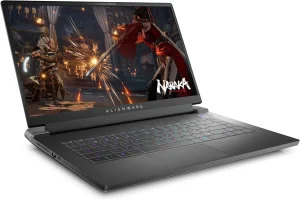
| Specifications | |
| Processor | 12th Gen Intel 14-core Processor |
| Memory | 16GB DDR5 RAM @ 4800MHz |
| Storage | 1TB PCIe NVMe M.2 SSD (x2) |
| Display | 15.6″ QHD (2560×1440) Non-Touch Screen, 240Hz Refresh Rate |
| Graphics | Nvidia GeForce RTX 3070 Ti with 8GB Dedicated Graphics RAM |
| Operating System | Windows 11 (with the option to downgrade to Windows 10) |
The Dell Alienware M15 packs some serious power, with its 12th-generation Intel 14-core processor. This allows for exceptional multitasking capabilities, ensuring smooth performance even when running demanding VR applications. The 16GB of DDR5 RAM clocked at a staggering 4800MHz ensures seamless multitasking and smooth browsing experience.
The 15.6-inch QHD display with a 240Hz refresh rate provides stunningly clear visuals and incredibly smooth gameplay. Whether I was exploring virtual worlds or engaging in intense VR battles, the visuals were sharp, vibrant, and free of any motion blur.
With a total storage capacity of 2TB thanks to the dual 1TB PCIe NVMe M.2 SSDs, I had ample space for my games, applications, and large files. The fast startup and data transfer speeds offered by the SSDs further enhanced the overall performance of the laptop.
Pros:
- Powerful 12th gen Intel processor for exceptional multitasking
- Stunning QHD display with a high refresh rate for immersive VR gaming
- Ample storage space with dual SSDs
- Dedicated graphics card for smooth gaming and content creation
Cons:
- The laptop can get quite hot during intense gaming sessions
- Battery life could be improved for extended VR gaming sessions
Buying Guide: 6 Factors to Consider When Choosing the Best Laptop for VR
Are you ready to dive into the immersive world of virtual reality gaming? Choosing the right laptop for your VR adventures is crucial to ensure a smooth and enjoyable experience. With so many options available, it can be overwhelming to make a decision. But fear not! As an expert in the field, I’m here to guide you through the process. Here are six factors to consider when choosing the best laptop for VR:
- Powerful Processor: VR applications require substantial processing power to deliver seamless performance. Look for laptops with the latest generation processors, preferably with high core counts. This ensures that your laptop can handle the demands of VR gaming without any lag or stutter.
- Graphics Capability: A dedicated graphics card is a must-have for VR gaming. Look for laptops equipped with high-performance GPUs, such as the Nvidia GeForce RTX series. These GPUs offer the necessary horsepower to render realistic graphics and provide a smooth VR experience.
- RAM and Storage: VR applications can be resource-intensive, so having an ample amount of RAM is essential. Aim for at least 16GB of RAM to ensure smooth multitasking. Additionally, consider laptops with fast and spacious storage options, like PCIe NVMe SSDs, to minimize loading times and provide ample space for your VR games and content.
- Display Quality: The display plays a crucial role in your VR experience. Look for laptops with high-resolution displays and fast refresh rates. A QHD or higher resolution, combined with a high refresh rate of 90Hz or above, will provide you with sharp visuals and smooth gameplay.
- Portability: If you plan on taking your VR experiences on the go, consider the portability of the laptop. Look for lightweight and compact laptops that are easy to carry around. However, keep in mind that more powerful laptops tend to be bulkier due to the additional cooling requirements.
- Battery Life: VR gaming can be demanding on battery life. Look for laptops with decent battery capacity to ensure that you can enjoy uninterrupted VR sessions without constantly worrying about finding a power outlet. Aim for laptops with at least 6-8 hours of battery life for a satisfactory experience.
FAQs
1. Can any laptop handle VR gaming, or do I need a specific laptop for it?
While some laptops may be capable of running VR applications, it is recommended to have a laptop with a dedicated graphics card, ample processing power, and sufficient RAM to ensure a smooth VR experience.
2. Do I need to prioritize a high-resolution display for VR gaming?
Yes, having a high-resolution display is important for a more immersive VR experience. Look for laptops with at least QHD resolution or higher to enjoy sharp visuals while gaming in virtual reality.
3. Is it necessary to have a laptop with a high refresh rate for VR gaming?
While a high refresh rate can enhance the smoothness of VR gameplay, it is not an absolute necessity. However, if you want to minimize motion blur and achieve a more realistic experience, consider laptops with a refresh rate of 90Hz or above.
4. Can I use a VR headset with any laptop, or are there compatibility issues?
Compatibility can vary depending on the VR headset and the laptop. Ensure that the laptop meets the minimum system requirements specified by the VR headset manufacturer to avoid any compatibility issues.
5. Are gaming laptops the best choice for VR gaming, or are there other options?
Gaming laptops are often a good choice for VR gaming due to their powerful hardware specifications. However, it is not the only option. Some high-performance laptops designed for content creation or professional use can also handle VR gaming effectively.
Conclusion
Choosing the best laptop for VR gaming is an exciting yet crucial decision. By considering factors such as a powerful processor, dedicated graphics card, ample RAM and storage, high-resolution display, portability, and decent battery life, you can ensure a smooth and immersive VR experience.
Remember to prioritize your needs and budget while making your choice. Whether you’re diving into virtual reality for gaming or other immersive experiences, finding the right laptop will be the key to unlocking a world of possibilities.